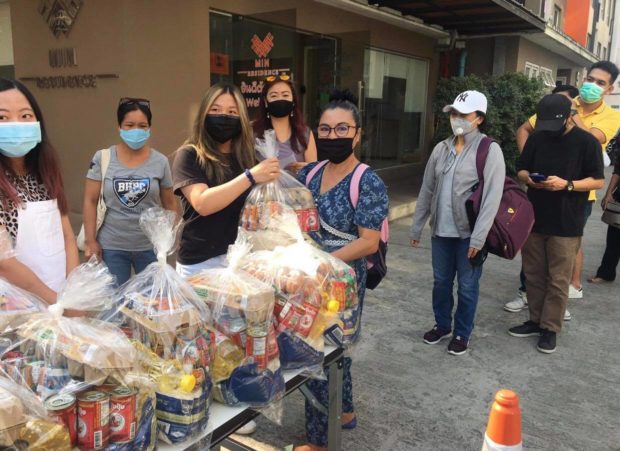By: Eunice Barbara C. Novio, INQUIRER.net /May 24, 2021
“Despite our situation here, we still send money to our families in the Philippines,” said Mara, a Filipino teacher.
She has an employment contract with Bangkok Metropolitan Administration (BMA), which operates public and private schools around Bangkok. She lives with her husband, also a teacher, and two young daughters.
Mara thought everything would return to normal, although the “new normal” when Thailand had zero-case in July 2020, isn’t what it is now.
Resumption of face-to-face classes was interrupted in December during the second wave of coronavirus infections that started in Samut Sakhon. It was contained shortly.
A third wave began in late March 2021 in Thonglor, a known nightlife district for high society in Bangkok, and pubs in Pathum Thani. The widespread infection worsened during the Songkran Festival in April when people traveled home for the holidays.
Mara has not received her salary for March. Her contract stipulated a no work, no pay scheme and only face-to-face classes.
Hotel, entertainment, and food industries are reeling from the stringent measures imposed by the government. Thousands of migrant workers, including Filipinos, had their visas and work permits revoked during the closures. The Thai Immigration Bureau is providing visa amnesty to those “stranded” which may end soon.
“Since December, our hotel in Bangkok has been closed,” Zherrie, a Filipino hotel worker, says. Fortunately, she was able to get compensation from social security.
To augment their incomes, both Mara and Zherrie are doing online business, selling Filipino food, items, or cosmetics.
But not all have the capital to start one.
“Helping-hand” spirit
Since the pandemic started, Bing Macatangay Arias, the interim vice president of United Filipinos in Thailand (UFT), spearheaded a food distribution project for Filipinos who either temporarily lost their jobs or are out of work.
Dubbed “Helping Hand Spirit of Filipino Constituents,” the project started with 259 food packs in March 2020. UFT estimated that it has already distributed over 20,000 food packs as of May 21. These had been distributed to 70 provinces in Thailand with most distributed in 20 areas in Bangkok and Nonthaburi. Donors and sponsors support the project.
The support comes from Filipinos, Thais and business groups, like Fast-Track Global and other individuals in Thailand and abroad, said Arias.
The food pack for an individual consists of five kilos of rice, condiments, noodles and sardines that may last for three weeks. It costs around 300- 350 Baht (between 450-550 Philippine Peso). Arias said there have been individual requests for financial assistance and medicines, milk or diapers.
The food packs are distributed by area coordinators in different provinces. Mara and Zherrie are coordinators in the food distribution in their designated areas.
Arias says there is still a growing need for food packs that may last as long as the pandemic hinders economic activity in Thailand.
An estimated 18,000 Filipinos reside in Thailand, taking jobs in teaching, management, engineering, architecture, hospitality, households, and business.
Embassy’s COVID-19 response
Last May 21, the number of COVID-19 cases in Thailand has reached 123,066 with 735 deaths and 79,504 recoveries. There are also some reports of Filipinos who tested positive for SARS Cov2, the virus that causes COVID-19, and had recovered.
According to a Reuters report, Thailand has administered coronavirus vaccines to over 2 million people out of its 66 million population.
The nationwide vaccine rollout will start in June. Teachers must be vaccinated in time for the opening of classes.
In an e-mail to INQUIRER.net, the Philippine Embassy said it “welcomes the initiative of Filipino community groups in Thailand to help each other during this time”. The embassy says that the effort was also in line with its “Bayanihan” efforts in Bangkok, Chiang Mai, Phuket and other Thai provinces at the onset of the pandemic in April 2020.
The embassy consular team says that Filipinos in need of assistance for Philippine government repatriation flights “funded by taxpayers, which is the government program of the Department of Foreign Affairs and its embassies” may avail themselves of the help but on a first-come, first-served basis, once funds are available for these flights.
Those returning home are also encouraged to avail themselves of financial assistance and loans from the Philippine government under the National Reintegration Center for OFWs. The Department of Labor and Employment (DOLE) has the DOLE-AKAP program, while the Overseas Workers Welfare Administration (OWWA) has programs for OWWA members and their dependents in the Philippines.
Since 2020, hundreds of Filipinos in Thailand are returning home. In March, April, and May, dozens of Philippine Airlines (PAL) flights have been cancelled due to the surge in COVID-19 cases in the Philippines. This resulted in a daily cap of 1,500 to 2,000 arriving passengers at NAIA that Philippine authorities are implementing.
In an e-mail, the Philippine Embassy says that it was working with PAL and authorities in Manila for additional passenger slots for flights to Manila. On May 12, there were 144 PAL passengers able to go home.
Mara and her family have chosen to remain in Thailand. Schools are expected to open on June 14.
“We have no savings yet. We will stay here. God is good,” Mara says.




